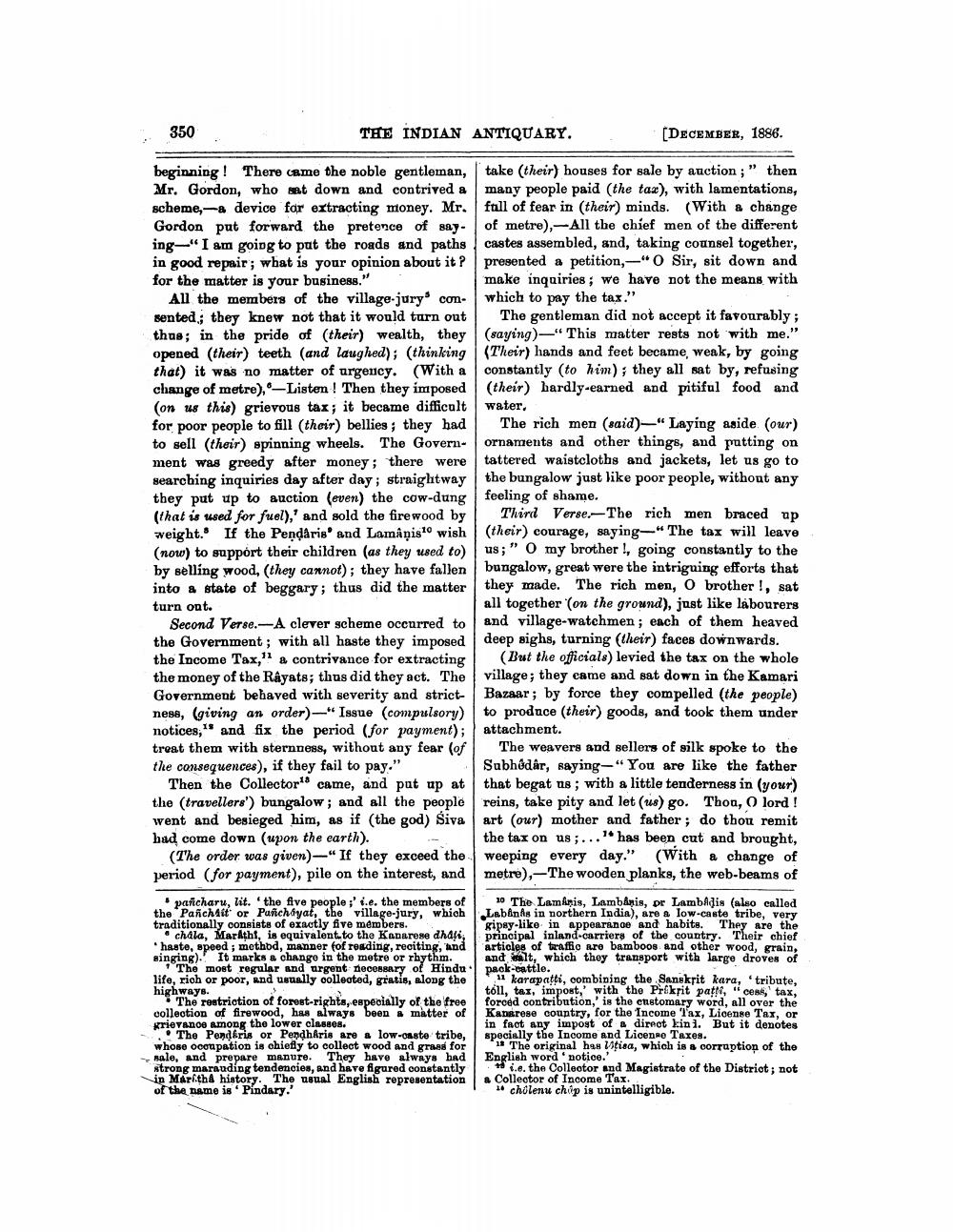________________
350
THE INDIAN ANTIQUARY.
DECEMBER, 1886.
beginning! There came the noble gentleman, take (their) houses for sale by auction;" then Mr. Gordon, who sit down and contrived a many people paid (the tax), with lamentations, scheme,-a device for extracting money. Mr. ftill of fear in (their) minds. (With a change Gordon put forward the pretence of say of metre), -All the chief men of the different ing-"I am going to put the roads and paths castes assembled, and, taking counsel together, in good repair; what is your opinion about it? presented a petition,-"O Sir, sit down and for the matter is your business."
make inquiries; we have not the means with All the members of the village.jury con- which to pay the tax." sented; they knew not that it would turn out The gentleman did not accept it favourably; thus; in the pride of (their) wealth, they saying)—"This matter rests not with me." opened (their) teeth (and laughed); (thinking (Their) hands and feet became, weak, by going that) it was no matter of urgency. (With a constantly (to him); they all sat by, refusing change of metre), - Listen ! Then they imposed (their) hardly-earned and pitiful food and (on us this) grievous tax; it became difficult water, for poor people to fill (their) bellies; they had The rich men (said)—"Laying aside (our) to sell (their) spinning wheels. The Govern- ornaments and other things, and putting on ment was greedy after money; there were tattered waistcloths and jackets, let us go to searching inquiries day after day; straightway | the bungalow just like poor people, without any they put up to auction (even) the cow-dung feeling of shame. (that is used for fuel),' and sold the firewood by Third Verse.-The rich men braced up weight. If the Pendáris' and Lamaņisto wish (their) courage, saying—"The tax will leave (now) to support their children (as they used to) us;" O my brother !, going constantly to the by selling wood, (they cannot); they have fallen bungalow, great were the intriguing efforts that into a state of beggary; thus did the matter they made. The rich men, O brother!, sat turn ont.
all together (on the ground), just like labourers Second Verse.- A clever scheme occurred to and village-watchmen; each of them heaved the Government; with all haste they imposed deep sighs, turning (their) faces downwards. the Income Tax," a contrivance for extracting (But the officials) levied the tax on the whole the money of the Râyats; thus did they act. The village; they came and sat down in the Kamari Government behaved with severity and strict- Bazaar; by force they compelled (the people) ness, giving an order) —" Issue (compulsory) to produce (their) goods, and took them under notices," and fix the period (for payment); attachment. treat them with sternness, without any fear (of The weavers and sellers of silk spoke to the the consequences), if they fail to pay."
Subhôdâr, saying-"You are like the father Then the Collectors came, and put up at that begat us, with a little tenderness in (your) the travellers') bungalow; and all the people reins, take pity and let (us) go. Thon, O lord ! went and besieged him, as if (the god) Siva art (our) mother and father ; do thou remit had come down (upon the earth).
the tax on us;..." has been cut and brought, (The order was given)-" If they exceed the weeping every day." (With a change of period (for payment), pile on the interest, and metre), -The wooden planks, the web-beams of
pancharu, lit. the five people ;' i.e. the members of the Panchit' or Panchayat, the village-jury, which traditionally consists of exactly five members.
chala, Marathi, is equivalent to the Kanarese dhani, haste, speed; method, manner fof reading, reciting, and singing). It marks a change in the metre or rhythm.
+ The most regular and urgent necessary of Hindu life, rich or poor, and usually collected, gratis, along the highways.
* The restriction of forest-rights, especially of the free collection of firewood, has always been a matter of krievance among the lower classes.
The Penderis or Pendhiris are a low-caste tribe, whose occupation is chiefly to collect wood and grand for sale, and prepare manure. They have always had strong marauding tendencies, and have figured constantly in Marith history. The usual English representation of the name is Píndary.'
10 The Lam Anis, Lambanis, pr LambAdis (also called Labin is in northern India), are a low-caste tribe, very gipay-like in appearance and habits. They are the principal inland-carriers of the country. Their chief articles of traffic are bamboos and other wood, grain, and wat, which they transport with large droves of paok-cattle.
11 karapatti, combining the Sanskrit kara, tribute, toll, tax, impost, with the Prekrit path, "ces, tax, forced contribution,' is the customary word, all over the Kangrese country, for the Income Tax, License Tax, or in fact any impost of a direct kind. But it denotes specially the Income and Licenno Taxes.
* 11 The original has itina, which is a corruption of the English word 'notice. . .. the Collector and Magistrate of the District; not a Collector of Income Tax...
1 cholenu chip is unintelligible.




